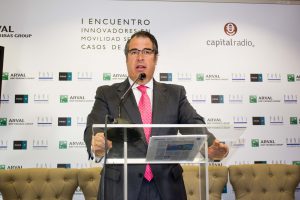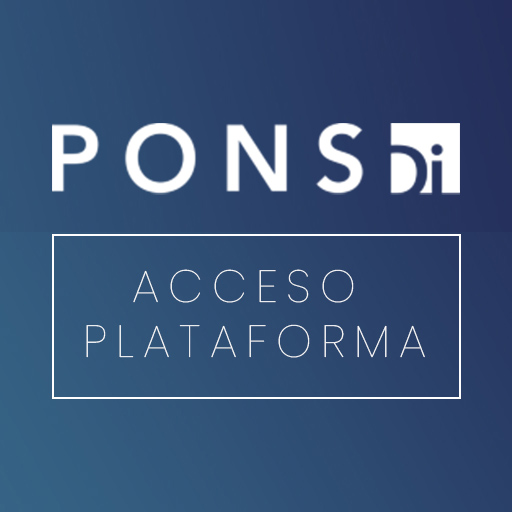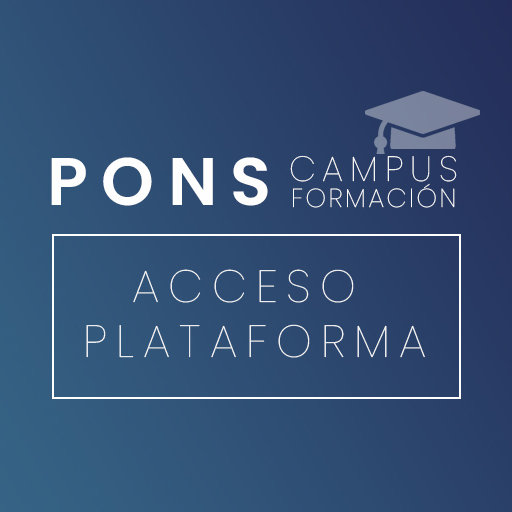-
- Eight innovative Spanish projects in road safety were key players in Fundación PONS; the majority of which were directed towards cyclists and children. These eight projects were: Rivemove, PF Road Prevention Systems, Blinkers, INVAR SV2, Spa4Roads, an “alcolock” device and Kidy Bus Harness.
Gregorio Serrano, the General Manager of Traffic, showed his support for the Spanish innovators in Road Safety.
Madrid, 1st March 2017. PONS Seguridad Vial (a leading company in public and private strategic mobility consultations) together with PONS IP (a Spanish firm specialising in the the integral assessment of industrial properties and intellectual and new technology), and thanks to the support of ARVAL España, have gathered together eight innovative Spanish projects at Fundación PONS headquarters. All eight projects have two common themes: they all share a Spanish origin and all are directed towards increasing the safety of our road journeys; either through private vehicle, bicycle, through improving our roads or public transport.
With a format inspired by the Anglo-saxon “elevator pitch” and in front of 75 representatives from the sector and innovators who attended the event, the participating companies had seven minutes to present their innovations: Rivemove – a children’s car seat safety accessory (SRI), Babyled – an illuminated warning device for the SRIs, PF Road Prevention Systems – a warning signal and prevention of using the device in road traffic, Blinkers – an integral safety device for cyclists, INVAR SV2 – an artificial vision system applied to Road Safety, Spa4Roads – a solution for road maintenance, Kidy Harness – a unique approved infant restraint designed for buses, and finally the event was brought to a close with an auto-start prevention device “Alcolock” which is in the commercialisation phase.
Gregorio Serrano López, the General Manager of Traffic, opened the event. He highlighted the role that Spain has in promoting innovation in the area of safe mobility. “For decades Spain has been promoting display systems, applications and services that accompany citizens and professionals on the road with clear objectives: to provide security; reduce delays by increasing accuracy in predicting journey times; and improve the quality of road transportation and the comfort of the citizens who travel on them. The improvement of driving aid systems and their progressive extension to all vehicles has had an essential contribution in the significant reduction in accident rates in Spain. Moreover, Spain will have, if anything, an even more prominent role thanks to increased automation in driving”. Serrano assures

In regards to the role of the Department of Traffic, Serrano stated that “seeing as it couldn’t be any other way, the DGT (Department of Traffic) supports and promotes everything that improves road safety. “And in this way, a commitment to new technology is a clear strategic line to follow; not only referring to an internal perspective as to what to use within the organisation itself, but expanding the sphere of outreach through participation in various instruments of promotion at both a European and international level”, Serrano concluded.
David Gonzalez on the other hand, Director of Business Development at PONS Seguridad Vial, reviewed the key issues that an innovative product in Road Safety must have from initial conceptualisation until the standardisation phase of the product has been reached. These key issues are understood as the authorisation of the use of the device or innovation. The head of PONS Seguridad Vial stressed the growing role of Spanish SMEs committed to allocating resources to R&D “in order to advance in the improvement of road safety”. The most important thing for González when it comes to looking for standardisation “is to comply with the current regulations and therefore it is highly recommended to accompany the project with an analysis from a technical consultant specialised in that field; this will without a doubt generate improvements in the product which clear the way for complying with the current regulations”.
The practical sessions were carried out with the contribution of Sergio Larreina, Technical Consulting Director of PONS IP. Larreina presented the funding opportunities through the European programme Horizon 2020 which is directed towards innovative SMEs in the field of Road Safety and the promotion of solutions to city mobility challenges. In order to be able to access this programme the Head of PONS IP has recommended the implementation of this state of the art programme that is “complete, exhaustive, concise, which reflects the state of the existing technique in an objective and meticulous way”. Larreina also emphasised the importance of integrating industrial property in the exploitation of the project, “protecting the management of the innovation results as they are, from the name of the project to the name of the products and the entire website”. Lastly, he recommended integrating the commercialisation and exploitation of the results, “taking into account the legal aspects, the situation of the market and the competition”.
Next Manuel Orejas, Director of Business Vehicle Observatory and promoted by the conference’s sponsoring entity ARVAL, gave credit to the role that mobility service providers could have in analysing the ‘puzzle’ that is mobility, providing relevant data regarding the driving habits of company cars “with the singular goal of contributing to the decline in the accident rate”.
Finally the Assistant Deputy Director of Research and Intervention at DGT, Juan Carlos Luque, brought the conference to a close with a speech; here he shared the organisation’s latest initiatives in respect to strategies for promoting research and innovation as tools to improve the running of Administration in its relationship with citizens and users of public roads, taking on new behaviours in mobility habits and with it the objective of improving road safety.
- Eight innovative Spanish projects in road safety were key players in Fundación PONS; the majority of which were directed towards cyclists and children. These eight projects were: Rivemove, PF Road Prevention Systems, Blinkers, INVAR SV2, Spa4Roads, an “alcolock” device and Kidy Bus Harness.



